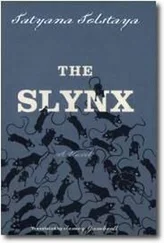“Hi!” Tamila shouted and laughed as if she were crying. “I was waiting for you.”
The ball lay at her feet, next to her flower-embroidered slippers. She was rocking back and forth, back and forth, and blue smoke rose from her jangling cigarette holder, and there was ash on her robe.
“I was waiting for you,” Tamila repeated. “Can you break the spell on me? No? Oh dear… I thought… Well, come get your ball.”
Petya wanted to stand there and look at her and hear what she would say next.
“What are you drinking?” he asked.
“Panacea” Tamila said, and drank some more. “Medicine for all evil and suffering, earthly and heavenly, for evening doubts, for nocturnal enemies. Do you like lemons?”
Petya thought and said: I do.
“Well, when you eat lemons, save the pits for me, all right? If you collect one hundred thousand pits and make them into a necklace, you can fly even higher than the trees, did you know that? If you want, we can fly together, I’ll show you a place where there’s buried treasure—but I forgot the word to open it up. Maybe we’ll think of it together.”
Petya didn’t know whether to believe her or not, but he wanted to keep looking at her, to watch her speak, watch her rock in that crazy chair, watch the copper rings jangle. She wasn’t teasing him, slyly watching his eyes to check: Well? This is interesting, isn’t it? Do you like it? She simply rocked and jangled, black and long, and consulted with Petya, and he understood: she would be his friend ages unto ages.
He came closer to look at the amazing rings shining on her hand. A snake with a blue eye circled her finger three times; next to it squatted a squashed silver toad. Tamila took off the snake and let him look at it, but she wouldn’t let him see the toad.
“Oh no, oh no; if you take that off, it’s the end of me. I’ll turn into black dust and the wind will scatter me. It protects me. I’m seven thousand years old, didn’t you know?”
It’s true, she’s seven thousand years old, but she should go on living, she shouldn’t take off the ring. She’s seen so much. She saw Atlantis perish—as she flew over the doomed world wearing her lemon-pit necklace. They had wanted to burn her at the stake for witchcraft, they were dragging her when she struggled free and soared up to the clouds: why else have the necklace? But then a dragon kidnapped her, carried her away from her glass mountain, from the glass palace, and the necklace was still there, hanging from her mirror.
“Do you want to marry me?”
Petya blushed and replied: I do.
“That’s settled. Just don’t let me down! We’ll ratify our union with a word of honor and some chocolates.”
And she handed him a whole dish of candies. That’s all she ate. And drank from that black bottle.
“Want to look at the books? They’re piled over there.”
Petya went over to the dusty mound and opened a book at random. It was a color picture: like a page from a book, but he couldn’t read the letters, and on top in the corner there was a big colored letter, all entwined with flat ribbon, grasses, and bells, and above that a creature, half-bird, half-woman.
“What’s that?” Petya asked.
“Who knows. They’re not mine,” Tamila said, rocking, jangling, and exhaling.
“Why is the bird like that?”
“Let me see. Ah, that bird. That’s the Sirin, the bird of death. Watch out for it: it will choke you. Have you heard somebody wailing, cuckooing in the woods at night? That’s this bird. It’s a night bird. There’s also the Finist. It used to fly to me often, but then we had a fight. And there’s another bird, the Alkonost. It gets up in the morning at dawn, all pink and transparent, you can see through it, and it sparkles. It makes its nest in water lilies. It lays one egg, very rare. Do you know why people pick lilies? They’re looking for the egg. Whoever finds it will feel a sense of longing all their life. But they still look for it, they still want it. Why, I have it. Would you like it?”
Tamila rocked once on the black bentwood rocker and went into the house. A beaded cushion fell from the seat. Petya touched it; it was cool. Tamila came back, and in her hand, jingling against the inside of her rings, was the magical egg, pink glass, tightly stuffed with golden sparkles.
“You’re not afraid? Hold it! Well, come visit me.” She laughed and fell into the rocker, moving the sweet, aromatic air.
Petya didn’t know what it was to be depressed for life, and took the egg.
Definitely, he would marry her. He had planned to marry his mother, but now that he had promised Tamila… He would definitely take his mother with him, too; and if it came to that, he could take Lenechka, as well… but Uncle Borya—no way. He loved his mother very, very much, but you’d never hear such strange and marvelous stories as Tamila’s from her. Eat and wash up—that was her whole conversation. And what they bought; onions or fish or something.
And she’d never even heard of the Alkonost bird. Better not tell her. And hed put the egg in a matchbox and not show it to anybody.
Petya lay in bed and thought about how he would live with Tamila in the big room with the Chinese roses. He would sit on the veranda steps and whittle sticks for a sailboat hed call The Flying Dutchman. Tamila would rock in her chair, drink the panacea, and talk. Then they would board The Flying Dutchman, the dragon flag on the mast, Tamila in her black robe on the deck, sunshine and salt spray, and they would set sail in search of Atlantis, lost in the shimmering briny deep.
He used to live a simple life: whittling, digging in the sand, reading adventure books; lying in bed, he would listen to the night trees anxiously moving outside his window, and think that miracles happened on distant islands, in parrot-filled jungles, or in tiny South America, narrowing downward, with its plastic Indians and rubber crocodiles. But the world, it turned out, was imbued with mystery, sadness, and magic, rustling in the branches, swaying in the dark waters. In the evenings, he and his mother walked along the lake: the sun set in the crenellated forest, the air smelled of blueberries and pine resin, and high above the ground red fir cones glimmered gold. The water in the lake looks cold, but when you put your hand in, it’s even hot. A large gray lady in a cream dress walks along the high shore: she walks slowly, using a stick, smiles gently, but her eyes are dark and her gaze empty. Many years ago her little daughter drowned in the lake, and she is waiting for her to come home: it’s bedtime, but the daughter still hasn’t come. The gray lady stops and asks, “What time is it?” When she hears the reply, she shakes her head. “Just think.” And when you come back, she’ll stop and ask again, “What time is it?”
Petya has felt sorry for the lady ever since he learned her secret. But Tamila says little girls don’t drown, they simply cannot drown. Children have gills: when they get underwater they turn into fish, though not right away. The girl is swimming around, a silver fish, and she pokes her head out, wanting to call to her mother. But she has no voice…
And here, not far away, is a boarded-up dacha. No one comes to live there, the porch is rotted through, the shutters nailed, the paths overgrown. Evil had been done in that dacha, and now no one can live there. The owners tried to get tenants, even offered them money to live there; but no, no one will. Some people tried, but they didn’t last three days: the lights went out by themselves, the water wouldn’t come to a boil in the kettle, wet laundry wouldn’t dry, knives dulled on their own, and the children couldn’t shut their eyes at night, sitting up like white columns in their beds.
Читать дальше












